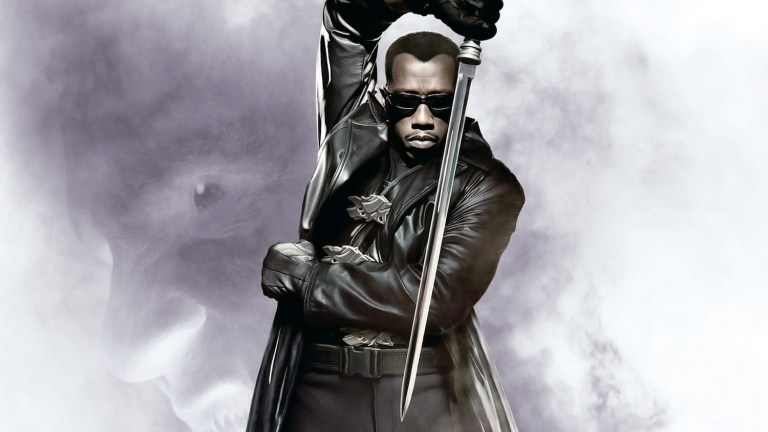Blade Isn’t Black Panther and Shouldn’t Try to Be
It's come out that Mahershala Ali and Marvel reportedly see Blade as another Black Panther. That might be a major reason they struggle to get the movie made.

Marvel’s 2019 San Diego Comic-Con panel in Hall H had a lot of exciting announcements for the time. But the most thrilling moment occurred at the end of the presentation when MCU boss Kevin Feige brought onto the stage Academy Award winner Mahershala Ali to announce a new Blade film. The audience erupted in cheers, excited by the idea of seeing the Daywalker onscreen again.
Twenty years earlier, about when the original Blade movie was released, such a response from even comic book fans would have been unthinkable. Not because superhero movies, especially those with Marvel heroes, were not popular. Rather it would have been unthinkable, because Blade was a character obscure even to most comic book readers. There were many who might’ve not even know the character existed until he showed up on Spider-Man: The Animated Series in 1995.
Yet, thanks to two great movies starring a never-cooler Wesley Snipes (and one terrible movie starring a never more checked-out Wesley Snipes), Blade went from third-tier Ghost Rider/Doctor Strange supporting character to an A-lister fans love.
Given that pedigree, it’s easy to see why Ali, who was fresh off his second Oscar win when nabbed the role, would think of Blade as “his Black Panther,” as revealed in a recent behind-the-scenes deep dive by The Hollywood Reporter. The article outlines the myriad problems in the production of Blade, including COVID-19, the writers strike, and now two directors leaving the project.
But among the big problems was perhaps that initial expectation. Blade is not Black Panther and never can be.
Like all superhero stories, Black Panther is a power fantasy. But where Spider-Man or Batman imagine what would happen if a nerdy teen or a traumatized kid gained fantastic abilities, Black Panther shows the power of a nation.
Whereas the real Africa has been subjected to colonialism and incessant Western plots to undermine the people and nations there, Wakanda has no taint of colonialism. Its people were not kidnapped and enslaved, its resources were not stolen, and it has not been a space for Western powers to compete with one another. Drawing from the sci-fi sub-genre Afro-Futurism, Black Panther shows a fantastic reality in which African peoples were left to themselves to control their own evolution and destiny.
None of this is to take away from the pure craft of the film itself. Ryan Coogler has inherent blockbuster instincts and he and co-writer Joe Robert Cole made a rich story with multiple characters and a theme about growing into global awareness and responsibility. Coogler fills his cast with some of the best Black actors working today too, including Chadwick Boseman, Michael B. Jordan, and Lupita Nyong’o, as well as an almost all-Black crew.
Blade can certainly match Black Panther on the level of craft. According to Hollywood Reporter, the film has had some impressive talent attached, beyond the great Ali. Delroy Lindo and Aaron Pierre had been signed in undisclosed roles, and scripts have been written and rewritten by later X-Men ’97 showrunner Beau DeMayo and True Detective creator Nic Pizzolatto.
But at its core, Blade is just a story about a vampire hunter. Not only are these stories very common in pop culture, from the many Dracula adaptations to the Underworld franchise to spoofs such as Blacula-hunter Jefferson Twilight in The Venture Brothers, but they tend to be relatively thin. Some versions of the new Blade script reportedly involve a secret society of bloodsuckers, a concept used not only in the first Blade from 1997 but also in the current Marvel Comics crossover Blood Hunt. In these plots, Blade uncovers a hidden global threat that only he, as a half-vampire with the ability to walk in the day, can stop. That’s exciting, sure. But is it as inspirational as the revelation of Wakanda? Can it speak to a people so often disparaged in media and pop culture? Will it appeal to a family audience who want their kids to see themselves as heroes, as opposed to self-loathing half-monsters who spend their lives fighting bloodsuckers in the night?
Probably not.
Without question, Blade has a lot of potential. There’s a reason that vampire stories get retold so often, especially in superhero comics such as Blood Hunt and DC vs. Vampires. The combination of horror and heroes is always compelling. Furthermore, people have long used vampires and other horror figures to speak on complex themes and real-world issues. But these stories tend to be darker and skeptical, lacking the hope and affirmations found in Black Panther.
Audiences want a Blade movie, especially one with Ali in the lead. But if the project is ever going to get out of development hell and become a movie that pleases everyone, its creators need to understand what they’ve got: a cool movie about a guy who kills vampires, not a superheroic vision of a great nation.
